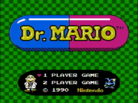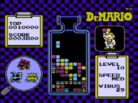Dr. Mario
| Dr. Mario | |
|---|---|
| Developer(s) | Nintendo |
| Publisher(s) | Nintendo |
| Platform(s) | NES, Arcade, Game Boy, Super NES, N64, GameCube (Japan only), GBA, Wii |
| Release | 1990 (NES/GB) |
| Gameplay info | |
| Next pieces | 1 |
| Playfield size | 8w x 11–16h |
| Hold piece | no |
| Hard drop | no |
Dr. Mario is a non-tetromino puzzle game franchise developed by Nintendo and released on its systems.
The bottle is 8 blocks wide by 11 to 16 blocks high (depending on version) and starts out partially full of "viruses", or fixed blocks of the color red, yellow, or blue.
Pieces in Dr. Mario are vitamin pills with two halves (making them dominoes), with each half colored red, yellow, or blue. The player can move or rotate them as they fall into the bottom. Once a pill locks, if four or more blocks of a color are aligned horizontally or vertically, they are removed, and the pill segments above them (but not viruses) fall in a cascade. In 2-player, cascades cause garbage pill segments to drop into the opponent's playfield. Anything that falls falls slowly, at a rate of 4 rows per second, due to the design of the playfield refresh logic.
Players who like Dr. Mario may also like Columns, Klax, and Puyo Pop.
The game Tetris 2 can be thought of as Dr. Mario with tetrominoes.
Rotation system
Ordinarily, the pills rotate within a 2x2 box whose bottom left corner is always filled. Clockwise rotation looks like this:
|
|
|
|
|
Wall kicks on Dr. Mario (NES), WarioWare Inc.: Mega Microgame$ (GBA), and Dr. Mario & Puzzle League (GBA) are as follows:
Horizontal to vertical:
|
|
| ||
|
|
No kick here |
Vertical to horizontal:
|
|
| ||
|
|
Kick left | ||
|
|
No kick here |
Tetris & Dr. Mario has some additional wall kicks from horizontal to vertical:
|
|
Kick right | ||
|
|
Kick down | ||
|
|
Kick down+right | ||
|
|
Fail |
See also
| ||||||||||||||

